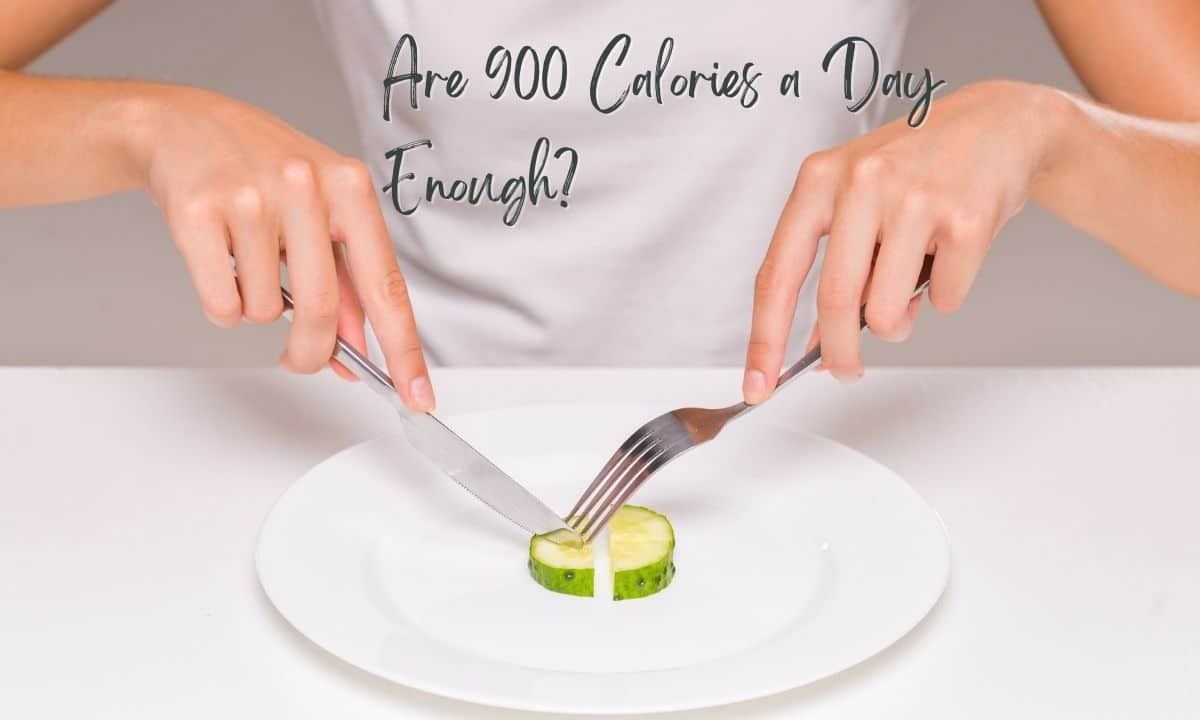Are 900 Calories a Day Enough?
The quest for weight loss often leads individuals to consider low-calorie diets. But how effective and safe are they?
Table of Contents
ToggleAre 900 calories a day enough?
900 Calories a Day Compared to Traditional Low-Calorie Diets
To lose weight, you need to eat fewer calories than you use. Experts often create a deficit of 500 calories a day when planning weight-loss programs for clients. For example, if you need 2,000 calories a day to fulfill your routine in a normal day, your nutrition expert will recommend a 1,500-calorie diet.
A traditional low-calorie diet requires a certain amount of calories. Women should consume at least 1,200 to 1,500 calories per day. Men need at least 1,500 to 1,800 calories per day. The number of calories might be higher if you start with a higher weight, exercise more, or are young.
Nine hundred calories a day is significantly lower than what’s normally recommended for weight loss.
However, it’s not technically considered a very low-calorie diet, either. Very low-calorie diets are between 500 and 800 calories per day. But it’s close enough that research on an 800-calorie diet applies.
What Happens When You Eat 900 Calories a Day?

When you eat less than your body requires, it enters a state frequently called “survival mode.” This refers to your body changing its normal functioning in order to conserve energy. When you enter “survival mode,” your metabolism slows down.
In this state, your body will start burning muscle for energy instead of fat. In the long term, losing muscle hinders weight loss because muscle helps you burn more calories overall.
Rapid weight loss will occur — IF you can maintain eating so little. It’s common for people following such a restrictive diet to binge after a few days.
Low-calorie diets can cause fatigue because you’re not getting enough nutrients and calories to fuel your body. Likely, you will also lose your mental edge.
Other potential side effects include dizziness and nutrient deficiencies.
Weight Loss
When following a very low-calorie diet, it’s common to experience rapid weight loss in the short term. This can be due to several factors, including water loss, muscle loss, and fat loss.
There is no doubt that such a low-calorie diet will result in weight loss. The amount of weight you lose will depend on several factors, including:
- current weight
- amount of physical activity
- age
- gender
- anything impacting how many calories you burn (such as a disease or condition)
- metabolism
For example, a 20-year-old female, 5’7″ in height with a current BMI of 35 who exercises will likely lose more weight than a 50-year-old female, 5’2″ tall with a current BMI of 24 who does not exercise. However, the 50-year-old might lose more muscle mass, which will have a negative impact on long-term weight maintenance.
Nutrient Deficiencies

A 900-calorie diet can be deficient in essential nutrients, including vitamins, minerals, protein, and healthy fats.
When you severely restrict your calorie intake, it becomes challenging to obtain all the necessary nutrients. This can result in deficiencies that can lead to various health problems.
Malnutrition
A 900-calorie-a-day diet may seem tempting for weight loss, but it will lead to malnutrition if followed for an extended period.
In clinical terms, it is possible to be malnourished and overweight or obese at the same time.
Malnutrition has such significance to health that a diagnosis of severe protein-energy malnutrition is considered an important comorbidity. It’s right up there with heart disease, dementia, and diabetes.
Metabolic Changes
Metabolic adaptations are a common consequence of calorie restriction. The body’s metabolism slows down in order to conserve energy and preserve muscle mass. This can make it more difficult to lose weight in the long run.
Mental Health
Low-calorie diets may also increase the risk of developing mental health issues, like depression, anxiety, and disordered eating.
Can 900 Calories a Day Be Safe?

It’s difficult to be on this type of diet in a safe way. For that reason, people normally follow a program like this under medical supervision. Your medical team can ensure that you are getting enough nutrients and monitor your health.
You will need supplements to get enough vitamins, minerals, and protein.
It’s advisable to be very careful with your food selection to ensure you don’t waste any calories on foods that are not nutrient-dense. You should avoid alcohol, sugar, and highly processed foods. The idea is to pack as many nutrients as possible into the calories you eat.
What to Eat in a 900-Calorie Diet
Understanding the importance of nutrient density is particularly crucial when following this diet.
Nutrient-dense foods provide the a relatively large amount of the vitamins, minerals, and other essential elements that the body needs to function. Prioritizing nutrient density can help prevent the deficiencies that can occur when food variety and quantity is limited on a low-calorie diet.
It also helps to minimize metabolic slowdown and the loss of muscle mass that can result from extreme calorie restriction. Therefore, ensuring that the limited calories consumed are from nutrient-dense sources is essential to support health and well-being.
Here are my tips to improve the nutrient density of a 900-calorie diet:
Focus on Protein

Protein plays a crucial role in regulating metabolism and supporting weight management. It increases satiety and promotes the preservation of lean muscle mass.
Foods high in protein include lean cuts of meat, poultry, fish, and eggs. Plant sources like legumes, nuts, seeds, tofu, tempeh, or seitan are also excellent options.
Eat Vegetables
Whatever your eating plan, including vegetables is vitally important for maintaining good health and well-being. Vegetables are rich in essential vitamins, minerals, fiber, and phytochemicals that provide a wide array of health benefits.
Eat Small Amounts of Healthy Fats
Incorporating healthy fats, such as those found in avocados, nuts, seeds, and olive oil, can contribute to a more balanced and satisfying meal. This makes it easier to adhere to a low-calorie regimen.
Additionally, healthy fats are essential for the absorption of fat-soluble vitamins and other important nutrients.
However, fats are the most energy-dense macronutrient, delivering nine calories per gram of fat. Thus, it’s essential to keep portion sizes very small to achieve the 900-calorie-a-day target.
Emphasize Fiber and Complex Carbohydrates
Fiber is an essential nutrient for good health. It plays an important role in promoting fullness, regulating blood sugar, and supporting digestive health.
Complex carbohydrates include vegetables, whole grains, legumes, and other high-fiber foods. In addition to providing fiber, these are excellent sources of vitamins, minerals, and antioxidants.
Drink Water
Staying well hydrated supports energy levels and the ability to concentrate throughout the day. Drinking plenty of fluids can also help to reduce hunger cravings.
Avoid Alcohol
Alcohol has calories that can add up quickly, making it difficult to stay within the 900-calorie limit. Plus, alcohol in your system makes it harder for your body to get all of the nutrients it needs from food.
Avoid Added Sugar and Sugary Drinks
It’s essential to avoid added sugar when on a very restrictive calorie-controlled eating plan because the empty calories it contains quickly add up.
Avoid Junk Food
Similarly, junk and processed foods are low in nutrients and high in calories.
Supplements
Because of the limitations in consuming only 900 calories a day, this diet may not provide all the essential vitamins, minerals, and other elements necessary for good health. You may experience deficiencies on this diet, despite consuming a variety of foods.
For that reason, a multivitamin is often recommended.
When starting this kind of restrictive plan, it’s best to consult your healthcare professional. A registered dietitian can help create an individualized meal plan tailored to meet your particular needs.
Example Meal Plan
Breakfast
2 eggs your way – cook using cooking spray
½ cup Greek yogurt (low in sugar)
½ cup blueberries
2 thin slices of bread (70 calories per slice)
Lunch
3 ounces of grilled chicken
1 cup quinoa
1 cup arugula salad served with lime juice and 1 teaspoon of olive oil
Dinner
4 ounces of baked salmon
6 asparagus spears with one teaspoon of olive oil
My Expert Opinion
Eating only 900 calories a day is not a nutritionally sound diet. But if you’re going to do it, it is important to understand how to incorporate the most nutrients.
As a doctor in clinical nutrition, I would not recommend such a low-calorie diet for weight loss. However, people who are taking weight loss medications, for example, are not hungry and reduce their calorie intake drastically. We must collaborate to prioritize nutrient-dense foods in order to get the best out of the food they do eat.
Be patient. If you’re overweight or obese, you didn’t gain the weight in a month. So don’t expect to lose it in a month.
Gradual but sustainable weight loss will help you reach your long-term goals with a smile and good health.

Dr. Su-Nui Escobar, a Registered Dietitian/Nutritionist in Miami, FL, is dedicated to empowering women in perimenopause and menopause to live healthier, more satisfying lives.
With a doctorate in clinical nutrition from the University of North Florida, she has expertise in menopause and weight loss, including the unique challenges faced by those on weight loss medications.
Su-Nui’s passion for her field is evident in her previous role as the Academy of Nutrition and Dietetics spokesperson.


